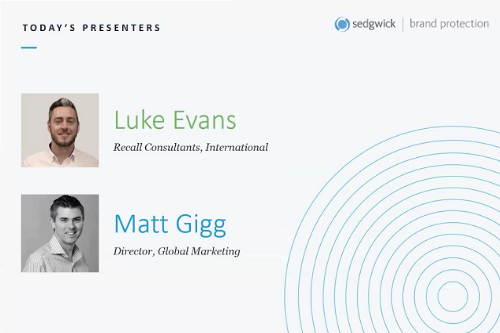

Sedgwick’s webinars on ‘European Product Recall and Safety’ have gained quite a following since their inception and yesterday’s market update was joined by attendees from over 40 countries. Introducing the discussion, Matt Gigg, director of global marketing at Sedgwick noted that the firm’s latest report explored insights into what recent recalls and regulatory development mean for future product safety across seven key sectors - automotive, food and beverage, pharmaceuticals, medical device, clothing, electronics, and toys.
Luke Evans, solutions manager at Sedgwick, noted that underpinning any analysis of reputational risks and the recall challenges facing companies today is the understanding that compliance and safety are moving targets, and that risks and regulations are evolving, so crisis and recall planning should follow suit – or better yet, stay one step ahead.
Automotive is just one example of what is covered in the report but digging deeper into this facet, Evans noted that advancements in autonomous driving, connected cars and electrified vehicles, all present unique regulatory, legal, financial and reputational risks for automakers, and original equipment manufacturers, or OEMs. They also expose consumers to new and unique safety risks, he said.
“The good news is that the automotive industry is in a unique recall position compared to other industries,” he said. “In most cases, automakers can track down a vehicle and make attempts to communicate directly to them. Taking it a step further, automakers have the ability to conduct remote repairs in response to recalls. Speaking of which, remote repair conversations have risen for us in the last quarter and represent a solution for different types of problems, such as older models or harder customers to get hold of and into a dealership.”
Looking at the stats, Evans noted that automotive recalls rose in the second quarter of this year. They were up 15.8% from 152 to 176 recalls, whereas the last (mostly) pre-pandemic Q1 of 2020 saw just 133 recall events. This is evidence that recall events are on the rise despite ongoing operational, supply chain and pandemic related challenges experienced by global automakers and OEMs, he said.
“Germany once again dominated in terms of notifications, submitting 129 recall alerts, or 73.8% of all recall alerts,” he said. “Which is nothing new… France was responsible for the second most notifications with 20, followed by Poland with 10 and Portugal with seven. Germany was also the leading country of origin for the second quarter recalls, with to 76, or 43.2%, of the recall events. France was the second most frequent country with 29. Japan with 16, the USA with nine and Italy with eight.
“Now, consistent with previous quarters, injuries remain the leading risk associated with automotive recalls. Injury recalls accounted for 138 or 78.4% of notifications. The next most common risk types were fire, cited in 22 recalls. The third was fire and injuries with 11 and this follows a trend identified over the last 18 months.”
These events have only increased in the face of the ongoing supply chain and pandemic-related challenges. For every industry explored within the Sedgwick presentation, the firm reached out to its partner network to get their perspective on market events.
“For automotive, we spoke with Daniel Carter, who is the manager for recalls and service programmes for Ford in Europe,” he said. “And we spoke specifically about innovation within the industry and its impact upon the evolving landscape. [And he states] that innovation will undoubtedly change the recall landscape in a dramatic way, increasing the penetration speed of recalls, but that it can also bring unexpected complications in consumer communication. [Meanwhile] automakers may be able to streamline the repair process by over-the-air updates and a strong positive strategy for customer meeting will remain critical to satisfaction.”
